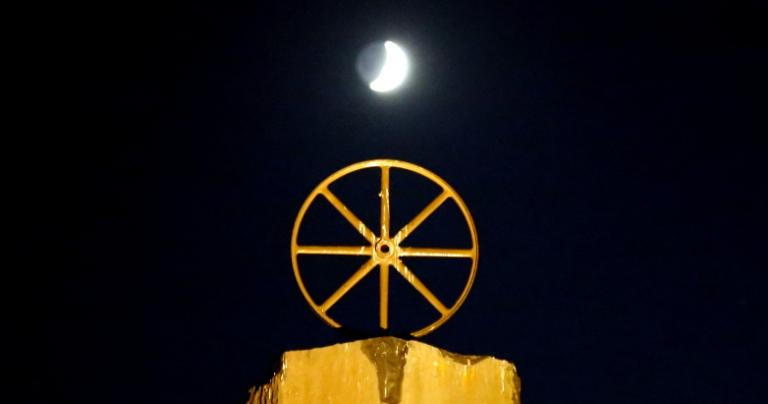Alexis Blair Penney sent me this piece from Religion Dispatches titled Magic in the Air: How Intellectuals Invented the Myth of a Mythless Society. It’s an interview with Jason Josephson-Storm, author of the recently released book The Myth of Disenchantment: Magic, Modernity, and the Birth of the Human Sciences. The interview was enough to get me to order the book – I’ll have more to say on the topic once I have a chance to read it. In this post, I want to talk more about myths.
Myths are stories to live by. They tell us who we are, where we came from, and where we belong. They tell what’s important in life – they communicate values and virtues. The idea that we have no myths is itself a myth – a story that says while stories may be entertaining and even inspiring, they contain no truth. It tells us there is nothing beyond the material world. It tells us to put our faith in Science not just for the things that science is good at – something I strongly support – but for everything.
This myth exists primarily as a reaction to the weaknesses and excesses of another myth – the myth that the Christian church has all the answers, or at least, all the answers that matter. That myth led to the burning of heretics and supposed witches, and the forced or coerced conversion of indigenous peoples. It’s still in the news with last week’s “Nashville Statement” of cold-hearted and regressive views on sexuality. Compared to this, the myth-of-no-myths is a decided improvement.
But it is still a myth that fails to live up to its promise. And it’s not the only one.
Here are three other harmful myths in our wider society, and three better alternatives.
The Myth of Progress
The Myth of Progress says that things have been getting better and will continue to get better in the future. It says history is linear and only points up. It’s Star Trek – onward and upward, our future is in the stars.
It’s easy to see how this myth came about. For the West, the last 300 years have been more or less continual progress. Knowledge, technology, and medicine have seen great improvements and there’s still no end in sight. And while we’ve still got a long way to go, there is truth in the quote from Theodore Parker made famous by Martin Luther King, Jr.: “the arc of the moral universe is long, but it bends toward justice.”
But we’re finally starting to understand that “progress” carries costs: the fossil fuels that power our society are polluting the air and water and changing the climate – and they’re running out. The cheap consumer goods that fill our homes are made with sweatshop labor, and they do not satisfy our souls.
They Myth of Progress is disproved by history – every civilization and every empire that has ever existed has eventually fallen. Babylon, Egypt, Rome, Britain… now the United States is clearly in imperial decline, and no amount of red MAGA caps can stop the slide.
Instead: The Myth of Cycles
Nature teaches that life is not linear, it is cyclical. Pagans celebrate the Wheel of the Year, not the inclined plane of the year. The moon waxes and wanes and then waxes again. What goes up must come down… unless it reaches escape velocity, demonstrating that there’s an exception to every rule.
I think it’s likely there’s a floor under Western civilization – nothing short of global nuclear war would sent us back to medieval times. But except for the very rich, the current generation of Westerners has or will have a lower standard of living than their parents, and that trend is likely to continue for several generations – maybe several centuries.
Until it in turn bottoms out, and things start moving upwards again. Endless progress is not possible, much less inevitable. Neither is endless decline.
Learn to spot where you are on a given cycle – set your expectations and make your plans accordingly.
The Myth of Materialism
Materialism is the doctrine that nothing exists except matter and its movements and modifications. It says there is no such thing as a soul and the mind is merely the interactions of brain chemistry. If something cannot be explained by “rational” science then it cannot exist. But as Gordon White of Rune Soup likes to say, materialism is an assumption of science, not a finding. Evidence that does not fit into the prescribed boundaries is simply ignored.
As with the myth-of-no-myths, the Myth of Materialism exists because it has been helpful in countering harmful myths about religion and the bloody impact of religious prejudice. But it has thrown the baby of spiritual connections and experiences out with the dirty bathwater of fundamentalism.
Instead: The Myth of Experience
What do we do when we experience something materialism says isn’t possible? If we want to avoid ridicule from those who “know better,” we rationalize it away or we keep it to ourselves. And yet when I wrote about seeing something that materialism says cannot be, I got comment after comment from people who had similar experiences.
What are we to do with thousands of reports of near death experiences and past life memories? What are we to do with magic that works so many times we can’t not believe it’s real? What are we to do with first-hand experiences of Gods, ancestors, and other spirits?
The Myth of Experience says that if you experience it, it’s real. We can debate what causes these experiences and what they mean, but that they happen is undeniably true.
Materialists ask “who ya gonna believe, me or your lying eyes?” I suggest you believe yourself.
The Myth of the Golden Age
The Golden Age Myth is Eden or Atlantis. It’s the peaceful matriarchal hunter-gatherer society or the proud independent pre-Christian European tribe. It’s a time in the past when everything was right, and then Something Went Wrong. Now things are inferior, but if we could just get back to the way things used to be, if we were just pure and pious, all would be right with the world.
Except there never was a Golden Age. Oh, there were times when things were better than they are now – see the Myth of Cycles. But things were better for some people, in some ways – memories are selective. The folks wearing those red MAGA caps are yearning for a time when things were great for straight white men and not so great for everyone else.
Even if we could restore the best parts of a past age, it wouldn’t be golden because the context would be radically different. While I’m interested in learning as much as I can about the original Druids, I’m not interested in trying to recreate iron age Druidry. I don’t live in pre-Roman Britain, I live in 21st century America. Our religions – and the rest of our culture – need to speak to our circumstances and our needs here and now.
Instead: The Myth of Context and Adaptation
I started to call this the Myth of Evolution, but there are still those who deny the science of biological evolution, so Context and Adaptation seems like a better choice.
The Myth of Context and Adaptation says that while values and virtues are timeless, their expression is not. A practice that was helpful and maybe even essential in a tribal desert society may be irrelevant or even harmful in the interconnected world of today. So rather than mindlessly copying what our ancestors did, or what we think they probably did, or what some ancient text tells us they did, we examine the context of our society and circumstances and we adapt our cultural and religious practices for the world in which we actually live.
Reciprocity and hospitality, sovereignty and autonomy, truth and honor, compassion and love: these are timeless. How we embody them and express them must be tailored to the world we live in here and now.
Examine your myths
Unexamined myths lead to bad assumptions, and bad assumptions lead to weak and harmful religion. We all have myths – stories that we live by. What are your myths? Do they help you live the kind of life you want to live? Or have they set you up for failure?
The good news is that if you find yourself clinging to a harmful myth, there’s a better alternative available.

















